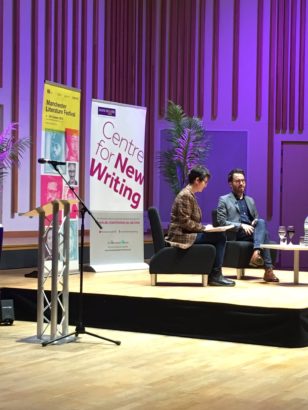 MLF Chapter & Verse
MLF Chapter & Verse
The Manchester Literature Festival Blog
Review: Take 2: Jonathan Safran Foer
Centre for New Writing student Erin McNamara is inspired by Jonathan Safran Foer’s collective call to action.
Jonathan Safran Foer has a plan to tackle climate change – but he wants you to come up with your own.
In conversation with Erica Wagner, former literary editor of The Times, the writer discussed his latest book – a non-fiction work on climate change that is not so much a call to arms as a call to question.
‘The fact is’, he says, ‘our planet is warming because of human activity’. He’s right – 97% of climate scientists agree with him. The logical conclusion is that human activity needs to change. This is difficult, though, isn’t it? We are beset on all sides by criticism, and by guilt-tripping – if you’re not a vegan, if you fly, if you drive, you personally are destroying the planet.
Foer believes that we need to be less hypocritical. We also need to stop expecting ourselves to become saints overnight, then giving up completely when this inevitably falls down.
Erica Wagner protests that she cannot imagine giving up milk in her coffee. Foer has a simple solution – don’t. Give up something else instead. Cycle more. Don’t eat meat on Mondays. ‘Start with the places it’s easiest’. He is not on some holier-than-thou mission – he simply wants us to ask questions. That’s how Wagner describes the book – We Are the Weather: Saving the Planet Begins at Breakfast – Foer asks questions of himself. He asks what he can do, how he can change his life.
It gets easier as it gets easier – the more people reduce the amount of meat in their diet, the more vegetarian options will appear in shops and restaurants, and the easier it will become to eat less meat.
He is adamant that we cannot do this alone. We are all going to succeed, or we are all going to fail. Foer damns the superiority and self-righteousness of the left for their part in creating a political gulf in what ought to be a unifying issue – ‘what’s more conservative than conservation’, he jokes: this is not an issue that ought to be splitting along party lines. Individuals can do their part – must do their part – but that alone is not enough. Good will and good words, he says, are not going to get us anywhere quickly. We need action, in the form of pressuring corporations and governments. Exercising power as consumers and, most importantly, voting.
Foer is quick to correct Wagner’s question about the book’s central thesis – because climate change is not a thesis. It is a scientific fact, not up for debate, and it’s important that we take this as our starting point. The four things humans do that have the most impact on the planet are eating animal products, flying, driving, and having children. Foer isn’t asking us to stop doing those four things immediately. He’s not asking us to stop doing those four things at all. He is simply asking us to ask questions – of our own life, and how we might adapt it. What our plan can be.
